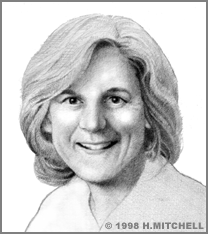Mary-Claire King
In a 25-year career of research, education, and activism, Mary-Claire King has succeeded not only in scientific innovation but also in making the world a better place.
Born in a Chicago suburb in 1946, King earned a BA in Mathematics at Carleton College in Minnesota at the age of 19. She then went directly to the University of California at Berkeley to study genetics. King left school to protest the Vietnam War, but she later returned and earned a PhD in 1973.
King's doctoral thesis revolutionized evolutionary biology. Through a comparative study of proteins, she proved that human and chimpanzee genomes are 99% identical. This places the divergence of the two species from a common ancestor at about 5 million years ago, rather than 10 million years ago, as was previously thought.
King's postdoctoral and professorial research has had more immediate ramifications. In 1974, she began to study the DNA of families in an attempt to find out whether breast cancer might be hereditary. Her colleagues were skeptical, believing instead that an indefinable combination of various genes and environment were the cause. Over years of painstaking research, King searched for a genetic "marker" – that is, an identified gene that tends to accompany the gene being searched for – that would flag the presence of the hereditary breast cancer gene in a chromosome. In 1990, after assessing 183 possible markers, King and her research team found the correct one on chromosome 17. In fact, they found that the marker was linked to a gene responsible for a number of different inherited breast and ovarian cancers.
King's discovery made it possible for others to pinpoint the cancer-causing gene itself, now known as BRCA1, in 1994. The isolation of BRCA1 has led in turn to direct diagnosis of the 5 to 10% of all breast cancer that is hereditary. Just as importantly, King's research has given geneticists insights into the nature of cancer-causing genetic mutations in general. King herself has used BRCA1 to develop a number of cancer testing, screening, and therapeutic procedures. For these, she has earned one patent (#5,622,829 in 1997) and has others pending.
During most of her search for BRCA1, King was a Professor of Genetics at Berkeley (1976-1995). She was also applying her expertise outside the academic realm. In 1984, King traveled to Argentina to take up the cause of the Abuelas de Plaza de Mayo. These were grandmothers of children who were kidnapped and whose mothers were murdered during Argentina's civil war in the 1970s. The dictatorship would not grant these grandparents custody of their grandchildren without "proof" of kinship. To give those families that proof, King helped to create a blood test, using genetic markers and mitochondrial DNA sequencing, that established with 99.9% certainty whether a given grandparent was, in fact, related to a given child. As a result of King's work, over 50 families have been formally reunited.
In 1995, King became American Cancer Society Professor of Medicine and Genetics at the University of Washington, where she continues to teach today. Her research includes breast cancer genetics, as well as mapping and cloning the gene for inherited deafness and analyzing the radically different effects that HIV has on each individual infected person's immune system. She also continues her humanitarian work. For example, her laboratory has become the DNA identification base for the United Nations War Crimes Tribunal.
Mary-Claire King thoroughly deserves the admiration she has won as an educator, an innovator, a scientist, and a humanist. King has five patents and over 250 peer-reviewed articles. She has received numerous awards for her work. On May 19, 2016, she was awarded the National Medal of Science, the nation’s highest recognition for scientific achievement.


